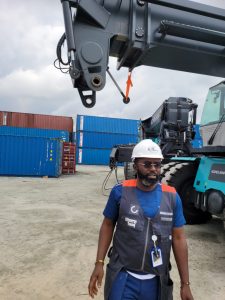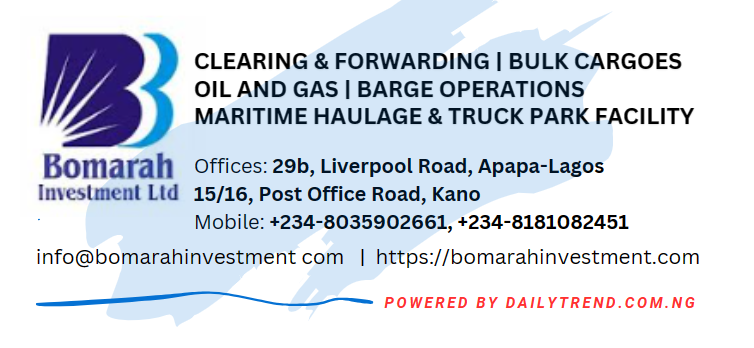Most Bonded Terminal Operators do not Really Invest in Equipment and Training—-James Kitiya

Mr James Kitiya, Managing Director KitiEnergy and Consulting Limited
…As Dala IDP, Eko Support Terminal, Others Bag Kiti Energy Corporate Awards

Mr James Kitiya is the Managing Director/Chief Executive Officer of KitiEnergy and Consulting Limited.
The company specialises in buying and selling of heavy duty cranes for port operations, hiring, leasing and training of operators for handling these equipment.
At its 2021 Corporate Awards held at the Rockview Hotels in Apapa Lagos on Tuesday, the company awarded some of its stakeholders and customers including Dala Inland Dry Port, Kano, Eko Support Terminal Apapa, Dabo Inland Dry Port Limited, International Container Terminal, Onne, Ports and Terminal Management Academy (POTEMAN) among others.
Speaking in an interview with DAILY TREND NEWS on the sidelines of the event, Mr James Kitiya underlined the importance of training crane operators. According to him, most bonded terminals in Nigeria do not have needed equipment, while many of them do not see the need for training of their operators.
Mr Kitiya however gave the Seaport Terminal Operators a clean bill of health, commending their investments in handling equipments.
Can you tell us a little about Kiti Energy, how and when did you start operations?
We started operations in 2014, covering West Africa but not so strong, this is because I am into Shipping and Maritime industry and I operate all equipment, so I used that advantage to move around different African countries. I started with Tema Port in Ghana, this is where I began to nurse the idea, from there I got to Nigerian Institute of Shipping (NIS) after NIS, I got into Port and Terminal Management Academy of Nigeria (POTEMAN) from there, I got my executive masters.

When I put together all I studied in maritime, I didn’t divert from what they taught me, these training institutions really changed and affected my life. I normally move from one conference to another, I was working with APM Terminals Apapa, when I get my payment, I used it for these conferences, as a matter of fact, in year 2018, I was using an Honda Car, I sold it N350,000 to attend a TOC conference at Rotherham, I bought that car about N800,000. But at the end of this sacrifice, I know what I learnt and I am very confident on it.
Coming back home, every equipment that lands into Africa, loaded from Antwep in Holland, this is one of the biggest Port where they ship equipment around the world, so, getting to know these people helped me a lot.

In Nigeria, we don’t have anything like a training school for equipment, we are the first to start training people on how to use the Reach Stacker and we issue them licenses and certificates.
In 2019 December, the pressure was much on me, I was now getting used to the business so I consulted, and at the end of the day, i floated my company after my 21-years experience within West Africa.
When we first started, Covid-19 affected the operations, but after the lockdown was lifted, people started patronising me in Ghana, as a matter of fact, 95% of my business is in Ghana.
When Nigerians want to buy anything in Ghana, they usually refer them back to me, this is because I also do checklist on equipment. In Nigeria today, if you want to get employed as Reach Stacker at any terminal, especially Medlog (a subsidiary of MSC Shipping) if you don’t have my certificate, they would not take you.
They would ask you to come to us and get trained first. The company first tested us, they gave us thirteen people for training, out of that thirteen people, it was only nine of them that passed.
Where you a former staff of APM Terminals Apapa?
I worked with Maersk Line and I received a ten years award, I was at Lilypond Container Terminal, from there I got into APM Terminals in 2013 up till 2019 when I resigned. I worked as an equipment operator. You can see that my 21years experience is strictly within the maritime sector, I did not change nor divert from handling equipment, anything that concerns cranes, that is what I do, so today, we train people.

In December 2021, we got one of our biggest contract in Onne Port, we trained all the equipment operators at Onne Multipurpose Terminal, and we issued them certificates, some of them failed exams, but many passed.
There are allegations that terminal operators do not invest enough in equipment, and they often employ foreigners to take over Nigerian jobs , how true is this?
It is true. Let me start with the equipment, in what we do today, there is what they call ‘pre-inspection’ and ‘post-inspection’, if you buy a new crane or fairly used one today, as it is going out for operations, we check it, as it is coming back, we also check it, if you don’t have a good maintenance culture, your equipment would always break down.
APMT bought about ten Reach Stackers in 2019, they equally bought RTG’s (Rubber Tire Gantries)
But if you go to these small Bonded Terminals, they don’t have these equipment, they only hire it, they come to us and we give them, what affects most of these Bonded Terminals is lack of maintenance culture.
If you buy any equipment because it is cheap in the market and you transport it to Nigeria, if that equipment breaks down after four months, it cannot be repaired again. However, there are common brands in the market which, if it breaks down today, you can go to the market, get its part and fix it.
In terms of equipment, for now, most of the bonded terminal operators are coming up, this year alone, they brought nine equipment to various Bonded Terminals.
Once you train your staff and they passed, your equipment would last longer, most of the Bonded Terminals do not have any handling equipment today, and this is due to the negligence of the operators, this game is not about the number of years you have been in operation.

Once any of the equipment damages, it could take up to three weeks to get the part to fix it back, so you need to train the operators to get certificates, if they fail to qualify, we send them back to mentorship, he would be seating beside an operator on duty and understudying him, after this, if the person failed to pick up, he would be sent away. We disqualified a lot of people at Medlog, if you allow them to operate the equipment, they would damage it, and once this happens, the freight forwarders don’t want to hear that your equipment is down or that you dont have equipment.
On the aspect of foreigners taking over the jobs that belong to Nigerians, I have an Indian man that came to my office, he got trained and he was issued certificate.
If you are dodging from training, then you prepare for damage. A trained equipment operator would always maintain your equipment.
The Reach Stacker can work for fifteen years, but what we fear is damage. Bringing in expatriates for now is the area where we have STS, or some of the big vessel cranes, but, we have a lot of good operators in Nigeria, some of them did not even go through any training. Some of them, when they come for training, they fail eye test and we send them back.
How much support have you been getting from terminal operators in terms of updating their staff?
I must say that Medlog/MSC Shipping are doing well with us, Eko Support Terminal, ICP Terminal, Dala Dry Port in Kano, Multinational terminal in Onne, Dabo Dry Port in Kano, Clarion Terminal among others, we trained their equipment operators.
Some terminals would wait until something happens before they would call us, if you come to our office you would see a lot of damages, a Reach Stacker that tumbled, meanwhile, a used one is sold for 15,000 Euro, you would still have to clear it at the port, and at the end of the day, somebody decided to tumble it.
What are the major challenges you face in this job?
We need more collaboration with some terminals so that we can use their Bonded Terminal as part of our training ground. Before you pass out of our training, you have to do thorough nights and day, this is because Shipping doesn’t have night or day or weekend, anytime the vessel arrives you have to discharge it.
What does Ghana have that Nigeria do not have? Why are people diverting attention and cargoes to Ghana?
First of all, Ghana has equipment but they do not have jobs. Any bonded terminal you enter in Tema Port, you can see a hundred containers with three cranes on standby, but in Nigeria, you would see 2,000 containers, one Reach Stacker.
Anything you are doing at Ghana Port is much easier based on the way they arranged their port, if you need training, they would give you their people and they approve.
But Nigerian Terminal operators do not really invest in equipment and training, it is not just to buy equipment, you need to train the people that would operate it, there are so many things they do not understand.
What inspired you to organise this award ceremony?
Most of our clients, they handed over equipment worth millions of Naira to our company because they know our worth, they have realised that our company; Kitty Energy, we provide operators and also provide engineers to watch over the operators, so their machines work longer without breaking down. We are the ones that hire these equipment to bonded terminals that need it for operations.
We also awarded a LASTMA (Lagos State Traffic Management Authority) operative situated under the Liverpool Bridge in Apapa because we sometimes pass equipment at night and you would always see him there, even at night.
2021 is gone, what is your assessment of the maritime sector?
Rating the industry from January would be difficult, but rating it from November 2021, I think all of them have put in a lot of efforts due to the Christmas season. But before Christmas, you can give it to the big guys; APM Terminals, SIFAX Group and others, these terminals can keep up to standard, they have a standard operation, PTML Terminal, they ways have equipment on standby, at least two, if one equipment breaks down, they switch to another which they repair the spoilt one, this is what bonded terminal operators are not doing, if they have two machines, they mount pressure on it until it breaks down and Clearing Agents start protesting. The bonded terminal need to wake up, you would find trucks lining up that they have not discharged, and it is the same challenge of lack of equipment all over. You cannot find this at the Seaport terminals, you cannot see queue inside the port.
Where do you see your company in the next five years?
I want to see my company going all over the world, not only in West Africa alone. Already, we want to commence our underwater training from next year, because we do underwater activities too, I am a professional diver as you look at me, and I have a team from Liberia. We want to see ourselves going big in the next two years, not even five years. Our branch in Ghana is performing very well.








I want to be part of this greater opportunity